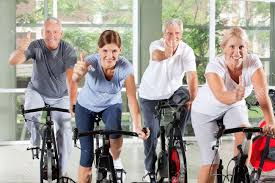Julie Matthews has the kind of voice that can lift you out of your seat. A voice that can make both hearts and walls tremble. She was born to sing. An award winning singer who regularly records and sings with many choirs and ensembles.
For her, oxygen is essential. Without it she can’t reach the high notes required of a soprano, or reach the volume necessary to fill an arena. Most of us don’t rely on our lungs to make a living, but we do face many of the same challenges.
As we age, what’s known as our aerobic capacity declines. It’s a natural part of the aging process. Simply put, the body’s ability to process oxygen correctly goes down.
“Singers over 50 are often not hired,” she says. And she just turned 50. “There has been some volume decrease as I’ve gotten older,” and she admits she can’t sing “full voice loud and not have it show my age a little.” Now, she says she has to take care of her voice more than ever.
Decreasing aerobic capacity makes it more difficult to walk, climb stairs, do housework, basically anything that requires physical exertion. The most comprehensive study done to date, out of Baltimore, shows the rate at which our aerobic capacity declines increases exponentially as we age.
The two easiest ways to improve how your body processes oxygen is to lose weight and exercise. Luckily, the two go hand-in-hand. Exercising helps with weight loss, weight loss makes exercising easier. Harvard Researchers suggest regular walking, jogging or biking to keep the circulatory system active.
For instance, most of us lose about 6% of our aerobic capacity between the ages of 20 and 30. We lose another 6% between 30 and 40. But, once we hit 40, our ability to utilize oxygen declines by 20% or more every, single decade thereafter.
You will probably first notice it in small ways, like feeling winded doing things you used to be able to do with ease. And the bad news is none of us are immune. The loss of aerobic fitness with age cannot be attributed to loss of muscle mass or to physical inactivity.
Researchers now believe that as we age our bodies change the way they deliver oxygen to exercising muscles or our muscles change the way they utilize oxygen. Either way, expect to start feeling more out of breath as you age.
Now, the good news. Research is showing that aerobic exercise can significantly slow the decline of aerobic capacity. A study of elite, long-distance runners who were studied over a 22-year period, found that middle aged men lost only 5-7% of their oxygen’s ability, compared to more than 20% for non-athletes. The key, researchers say, is to continue rigorous, routine exercise.
The average person will likely not be able to accomplish such dramatic results. But the National Institutes of Health is finding that any sustained exercise can slow the progression. Again, the key is to exercise regularly.
Staying active helps maintain a healthy aerobic capacity and that effects your entire body. That means it’s easier to move, to do everyday activities, even to think more clearly.
Our singer is doing just that. Not only to keep her voice in shape, but her body as well. She says she’s “probably lost 40 pounds in the last two years or so.” Even though she says she’s often too busy for regular exercise at a gym, she incorporates it into her day by walking, stretching, even doing squats while she curls her hair in the morning.
If you’re goal is weight loss — then aerobic exercise will help you fight the results of aging as well as assist in your weight loss goals.

